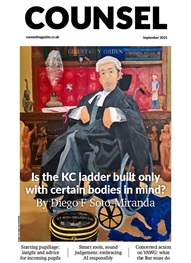*/
One judge-led method of saving money and clearing the Crown Court lists has been rejected by the Court of Appeal.
In a judgment of 3 August, the Court of Appeal ([2010] EWCA Crim 1931) disapproved of events at Woolwich Crown Court on 12 and 13 July 2010. Having already told the prosecution, “This country is next to broke, we do not enjoy the luxury of being able to spend two days of a judge and jury’s time on this kind of thing” (the defendant had elected trial by jury), Judge Shorrock indicated during the prosecution case that he would withdraw one count from the jury “whatever happens”, doubting that “a Woolwich jury” would convict. It was indeed withdrawn despite the Crown’s formal indication that it would appeal his preliminary ruling.
On the same day as this trial, the Court of Appeal was coincidentally hearing argument in three conjoined appeals, where Judge Shorrock had quashed the indictment because he did not believe that the matters should have been brought before the Crown Court. Holding that the judge “had no power to proceed as he did”, Lord Justice Leveson ([2010] EWCA Crim 1857) quoted Lord Salmon in Connelly v DPP [1964] AC 1254 that a judge has no power “to refuse to allow a prosecution to proceed merely because he considers, that, as a matter of policy, it ought not to have been brought”.
The Court of Appeal rejected counsel’s argument that judges should not be obliged to “grin and bear it when finding their lists ‘clogged up’”. They were perfectly entitled appropriately to express their views and to encourage the prosecution to reconsider the public interest in prosecution while bearing in mind the fact that Parliament gave the final decision to the CPS (subject to judicial review), and that it is for Parliament to alter the law on what type of case is to be tried by juries.
All four matters have been sent back for trial at Woolwich, before a different judge.
In a judgment of 3 August, the Court of Appeal ([2010] EWCA Crim 1931) disapproved of events at Woolwich Crown Court on 12 and 13 July 2010. Having already told the prosecution, “This country is next to broke, we do not enjoy the luxury of being able to spend two days of a judge and jury’s time on this kind of thing” (the defendant had elected trial by jury), Judge Shorrock indicated during the prosecution case that he would withdraw one count from the jury “whatever happens”, doubting that “a Woolwich jury” would convict. It was indeed withdrawn despite the Crown’s formal indication that it would appeal his preliminary ruling.
On the same day as this trial, the Court of Appeal was coincidentally hearing argument in three conjoined appeals, where Judge Shorrock had quashed the indictment because he did not believe that the matters should have been brought before the Crown Court. Holding that the judge “had no power to proceed as he did”, Lord Justice Leveson ([2010] EWCA Crim 1857) quoted Lord Salmon in Connelly v DPP [1964] AC 1254 that a judge has no power “to refuse to allow a prosecution to proceed merely because he considers, that, as a matter of policy, it ought not to have been brought”.
The Court of Appeal rejected counsel’s argument that judges should not be obliged to “grin and bear it when finding their lists ‘clogged up’”. They were perfectly entitled appropriately to express their views and to encourage the prosecution to reconsider the public interest in prosecution while bearing in mind the fact that Parliament gave the final decision to the CPS (subject to judicial review), and that it is for Parliament to alter the law on what type of case is to be tried by juries.
All four matters have been sent back for trial at Woolwich, before a different judge.
One judge-led method of saving money and clearing the Crown Court lists has been rejected by the Court of Appeal.


Chair of the Bar sets out a busy calendar for the rest of the year
By Louise Crush of Westgate Wealth Management
Examined by Marie Law, Director of Toxicology at AlphaBiolabs
Time is precious for barristers. Every moment spent chasing paperwork, organising diaries, or managing admin is time taken away from what matters most: preparation, advocacy and your clients. That’s where Eden Assistants step in
AlphaBiolabs has announced its latest Giving Back donation to RAY Ceredigion, a grassroots West Wales charity that provides play, learning and community opportunities for families across Ceredigion County
Rachel Davenport, Co-founder and Director at AlphaBiolabs, outlines why barristers, solicitors, judges, social workers and local authorities across the UK trust AlphaBiolabs for court-admissible testing
Through small but meaningful efforts, we can restore the sense of collegiality that has been so sorely eroded, says Baldip Singh
Come in with your eyes open, but don’t let fear cloud the prospect. A view from practice by John Dove
Looking to develop a specialist practice? Mariya Peykova discusses the benefits of secondments and her placement at the Information Commissioner’s Office
Anon Academic explains why he’s leaving the world of English literature for the Bar – after all, the two are not as far apart as they may first seem...
Review by Stephen Cragg KC